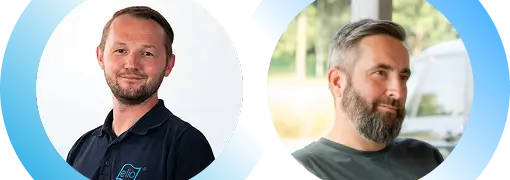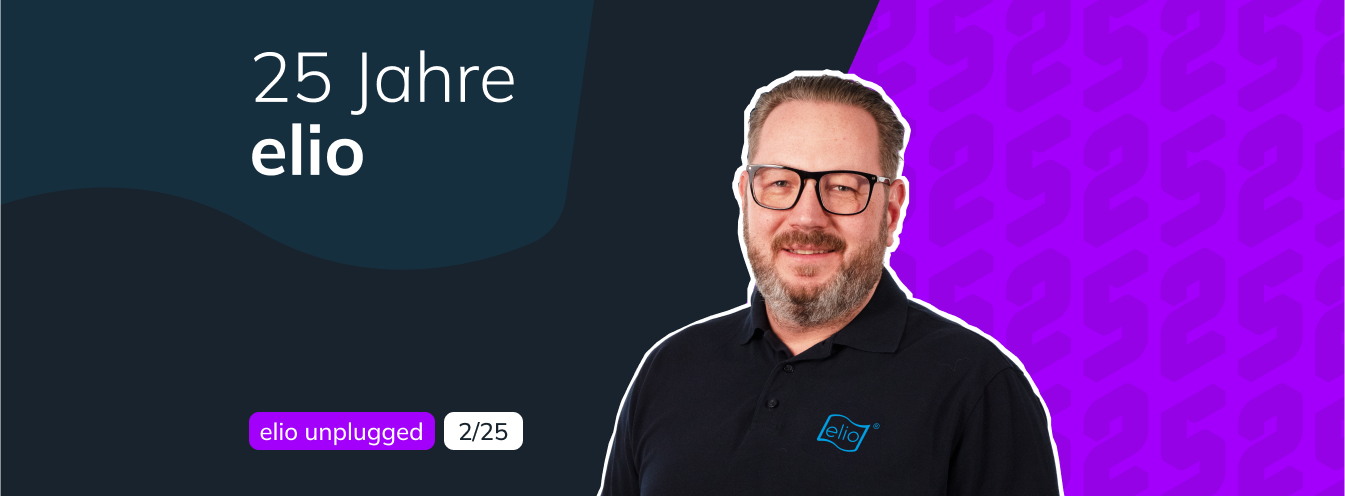Today, elio realizes sophisticated e-commerce projects with customers from all over Germany. But even we started out small - and our first major customer project was more than just a milestone. It was a real learning moment over 15 years ago.
In this interview, Sascha Vorderstemann, CEO and founder of elio, tells Alicia Weigel, Online Marketing Manager at elio, how it all began, what went surprisingly well 15 years ago, where things got stuck - and what has remained to this day.
Alicia: When you think back to elio's first major customer project, what is the first thing that comes to mind?
Sascha: Two key words: efficiency and consolidation. That's exactly where we were able to help the customer enormously. The project was a milestone in many respects - for them and for us. It was about bundling different stores and processes to make everything much more efficient. It was a huge challenge for us at the time - but also a great opportunity. We were able to show what we were made of.
Alicia: What was the aim of the project and what exactly was implemented at the time?
Sascha: The customer had three self-developed online stores in use, all connected with Microsoft Dynamics Navision - and was also planning a fourth store. Our task was to consolidate this landscape: In other words, to replace three stores with a multi-shop system that also offered space for a fourth brand. At the same time, the previous three interfaces to Navision were to be reduced to a single one. This not only massively reduced the potential for errors, but also significantly increased efficiency. At that time, the concept of a multi-shop system was still almost unknown - it was really new to the market. But then Shopware came along.
Alicia: The project was over 15 years ago. What was particularly challenging back then?
Sascha: Firstly, the technology. We were working with Shopware for the first time - the system was still brand new on the market at the time. And to be honest, it still had a few teething problems. But that's exactly where we started. We not only developed solutions for the customer, but also analyzed and fixed many bugs directly and actively fed the feedback back to Shopware. This allowed us not only to use the system, but also to help shape it.
Secondly: the physical distance. The customer was in Munich, we were in Giessen. Today, many things are done via video calls, but back then this was hardly common. So we showed our presence - we held workshops on site, worked closely with the customer and were always in contact.
It was also special that HP - i.e. Hewlett-Packard - was involved in the project. Not directly our customer, but indirectly involved. And of course a large corporation like that takes a very close look when a young company like ours suddenly gets involved. That was quite something - and motivated us even more to deliver.
Alicia: I can imagine that. What did you particularly enjoy about this project?
Sascha: Our speed. The fact that we familiarized ourselves with a completely new system - and still kept to the schedule we had set ourselves. That was a great feeling. You could just tell that we work as a team. We were solution-oriented, motivated and got the job done together. It was precisely this energy that characterized elio from the very beginning - and still does today.
Alicia: What might have gone wrong - and what did you learn about elio or yourself?
Sascha: We were already using our own interface software back then - it was still called eliobase, now synQup. And to be honest, there was definitely still room for improvement. We put in far too much effort and realized that we needed to work more efficiently. Looking back, this experience was extremely valuable. It showed us where we needed to start - and was a real starting signal for further development into what synQup is today, for example.
Alicia: Are there things from this project that you still use or pass on today?
Sascha: Absolutely. I learned from this project how important real independence is for our customers. That was also a cornerstone for my independence back then. My aspiration was and still is: The customer must be able to ensure their success independently of me or elio. Only then can a collaboration be truly sustainable. In the project back then, the dependencies were huge - and it was a great success that we gradually dissolved them. That shaped me and has stayed with me to this day.
Alicia: And when you look back from then to now - do you recognize certain patterns, challenges or developments?
Sascha: Definitely. I still see many companies today that are strongly rooted in old ways of thinking and systems in their IT structure. Although we live in the age of AI, ChatGPT, Gemini and the like, many are still working with outdated ERP systems, static e-commerce platforms or even home-made solutions. Sure, “never change a running system” is a common thought - but it can also get in the way. It's not about redoing everything, but about recognizing the potential. This is exactly where we come in today: We help to create sustainability - in a very practical and tangible way.
Alicia: In summary, what is it about this project that still makes you so proud today?
Sascha: The trust. The customer didn't know us at the time, and yet he chose us. That was a big deal for us as a young company - and I think we more than justified this trust.
Alicia: A leap of faith that gave you quite a boost back then, didn't it?
Sascha: Absolutely. That motivates - and obliges.
Alicia: And if you could face your former self again - what would you tell him?
Sascha: I would definitely advise my former self to invest in project management much earlier. We have always been strong in terms of technology - many companies would lick their fingers at that. But technology alone is not enough. We should also have looked at structures and processes earlier. That would have saved us work - and our customers too.
Today we know: It doesn't work without professional project management. Together with our customers, we define clear goals - both short-term and long-term - and consider from the outset what is needed to ensure that the customer does not reach its limits again in a few years' time.
This strategic approach is a big part of our further development: away from pure developer thinking and towards more structure, more focus, more team play. And this is particularly important for me to emphasize: Success doesn't lie with individuals - it lies in the team. Without my team, I am nothing. You should always be aware of that.
Even though this project took place over 15 years ago, the lessons we learned from it still shape our work today. Technology evolves, requirements change, but one thing remains the same: in the end, it's always about finding the best solution with the right people around the table.
Are you currently facing a similar challenge? Perhaps with several stores, outdated interfaces or the question: How do I bring it all together without losing track? Then get in touch with us - we look forward to hearing your story.

